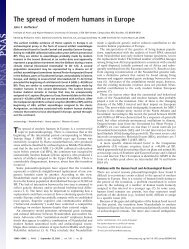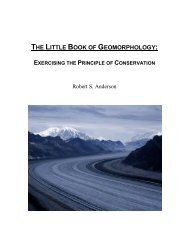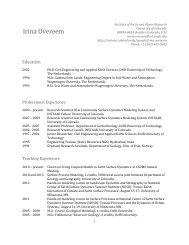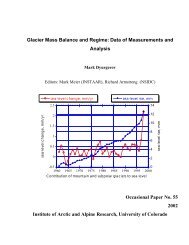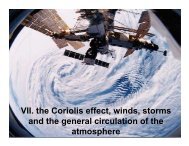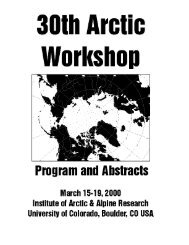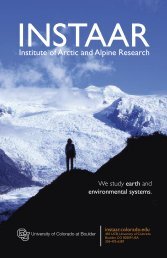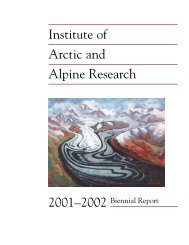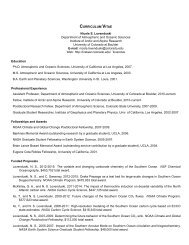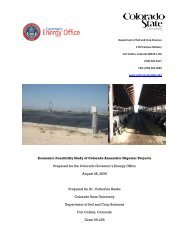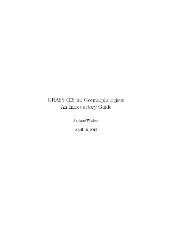00_cover_Biennial Report 05-06.qxd - INSTAAR - University of ...
00_cover_Biennial Report 05-06.qxd - INSTAAR - University of ...
00_cover_Biennial Report 05-06.qxd - INSTAAR - University of ...
- No tags were found...
Create successful ePaper yourself
Turn your PDF publications into a flip-book with our unique Google optimized e-Paper software.
<strong>INSTAAR</strong>: An Earth andEnvironmental Systems Institute<strong>University</strong> <strong>of</strong> Colorado at BoulderThe Institute <strong>of</strong> Arctic and Alpine Research (<strong>INSTAAR</strong>)develops scientific knowledge <strong>of</strong> physical and biogeochemicalenvironmental processes at local, regional, andglobal scales and applies this knowledge to improve society’sawareness and understanding <strong>of</strong> natural and anthropogenicenvironmental change. The world’s high-altitudeand high-latitude regions are the Institute’s traditional focusdue to their sensitivity to environmental change. <strong>INSTAAR</strong>has increasingly broadened its geographic focus in a widerange <strong>of</strong> interdisciplinary studies <strong>of</strong> Quaternary and modernenvironments, research into geochronology, human andecosystem ecology, hydrology, oceanography, landscapeevolution, biogeochemistry, and climate. <strong>INSTAAR</strong>’snational and international research leadership in these areasis augmented by exceptional strength in graduate educationas well as the exposure <strong>of</strong> undergraduates to the researchprocess, and by outreach to the public both locally andnationally.<strong>INSTAAR</strong>’s Research Activities integrate field studies, state<strong>of</strong>-the-artlaboratory experiments, field and laboratory sampleanalysis, and numerical and laboratory modeling.<strong>INSTAAR</strong> efforts emphasize three main spheres <strong>of</strong> research.The Ecosystems Group focuses on biogeochemicalprocesses <strong>of</strong> terrestrial and aquatic systems, biodiversity,ecosystem disturbance and re<strong>cover</strong>y, modeling <strong>of</strong> biotic patterns,ecological assessments, and surface-atmosphere gasexchange and atmospheric transport. Long-Term EcologicalResearch (LTER) studies in alpine and polar regions, involvingpopulations and communities, biogeochemistry, andecophysiology, are emphasized. Feedbacks <strong>of</strong> snow <strong>cover</strong>changes on biogeochemistry and gas exchange processesare studied in both mid-latitude and in polar environments.Research tools include field experimental manipulations,isotopic tracers, long-term monitoring <strong>of</strong> ecosystem patternsand processes, modern analytical instrumentation, geographicinformation systems (GIS), remote sensing, fluxmeasurement techniques, and ecosystem modeling. Both<strong>INSTAAR</strong> and its Mountain Research Station <strong>of</strong>fer worldclassfield and laboratory facilities to support these yearroundresearch efforts.The Geophysics Group applies quantitative field andnumerical methods to dis<strong>cover</strong> the properties and dynamics<strong>of</strong> snow, ice, water, and sediments in the world’s oceans,glaciers, and land areas. Methods <strong>of</strong> analysis include theoreticaland numerical development; remote sensing; land,airborne, and ship-borne field experiments, all applied toresearch topics in hydrology, glaciology, frozen-ground studies,paleoclimatology, physical oceanography, and marinegeology. To facilitate such research, the EnvironmentalComputation and Imaging (ECI) Facility providesresearchers with supercomputer power and global connectionsto geophysical databases.The Past Global Change Group focuses on reconstructingthe dynamics <strong>of</strong> paleoenvironments and past climatevariability to enhance our understanding <strong>of</strong> the interactionsbetween all components <strong>of</strong> the earth system, includingatmosphere, ocean, land, ice, the biosphere, and humanecology. Integration <strong>of</strong> a variety <strong>of</strong> records from a globalnetwork <strong>of</strong> sites, including polar ice caps, continental alpineregions, and the world’s oceans, provides the capability totest conceptual and predictive global change models, t<strong>of</strong>acilitate the differentiation between natural and humaninducedchange, and to study the human impacts <strong>of</strong>changes. These efforts are enhanced by the Center forGeochemical Analysis <strong>of</strong> the Global Environment (GAGE),which promotes fundamental research in the developmentand application <strong>of</strong> analytical methods that reveal past andpresent changes in Earth’s climate, its land surface, andmajor biogeochemical cycles.<strong>INSTAAR</strong>’s Teaching Mission is directed toward fosteringan appreciation and understanding <strong>of</strong> the biological,chemical, and physical processes operating in continentaland ocean environments. The Mountain Research Stationand other study sites in the mountains <strong>of</strong> Colorado aid theeducational efforts <strong>of</strong> the Institute. <strong>INSTAAR</strong> supports the<strong>University</strong> <strong>of</strong> Colorado’s educational mission and providesinterdisciplinary graduate and undergraduate classes andresearch opportunities; the Institute has led educationefforts that integrate students across multiple departmentsand colleges. Our teaching mission includes internationaleducational experiences for <strong>University</strong> <strong>of</strong> Colorado students,training <strong>of</strong> foreign students, and volunteer outreach to communityschools and various other external constituencies.<strong>INSTAAR</strong>’s Societal Mission consists <strong>of</strong> activities inresearch, education, and science leadership. These activitiesaddress critical concerns involving issues such as ecosystemresilience, biodiversity, water resources, agriculture, nationalsecurity, and resources in sites ranging from the alpine areas<strong>of</strong> the Rocky Mountains to the remote regions <strong>of</strong> the world.Our expertise is applied to predictive understanding <strong>of</strong> environmentalprocesses, including the maintenance <strong>of</strong> waterquality and anticipating and responding to long-term environmentalalterations. Changes and disturbance in highlatituderegions not only affect the lives <strong>of</strong> indigenous residentsbut also, through global teleconnections, have a bearingon the lives <strong>of</strong> people everywhere.Information regarding theInstitute <strong>of</strong> Arctic and AlpineResearch, the Niwot Ridge Long-Term Ecological Research (LTER)Program, the Mountain ResearchStation, and the journal Arctic,Antarctic, and Alpine Researchis available on the World WideWeb at, respectively:instaar.colorado.educulter.colorado.edu:1030/www.colorado.edu/mrs/instaar.colorado.edu/AAAR/INTRODUCTION | 3



